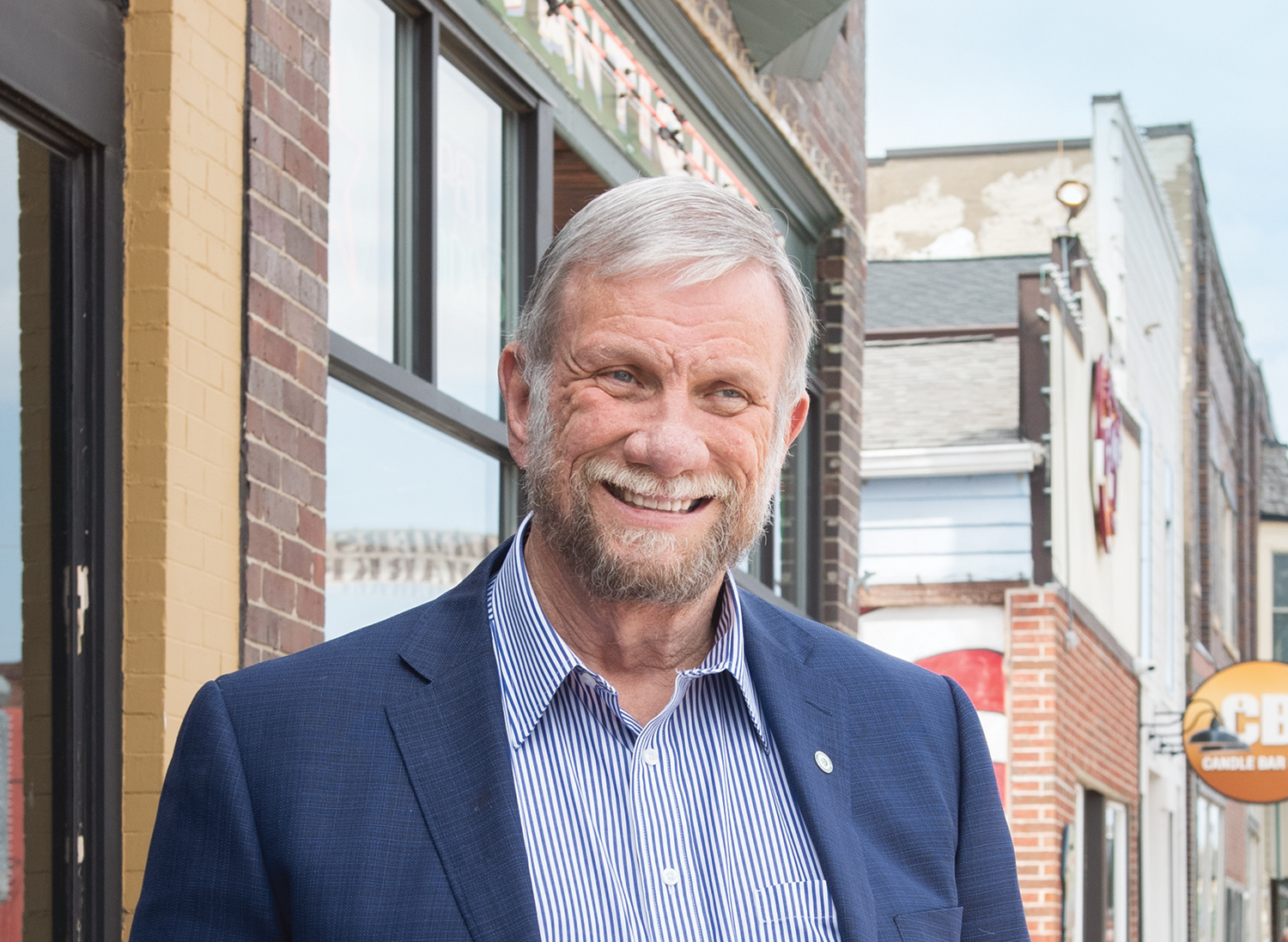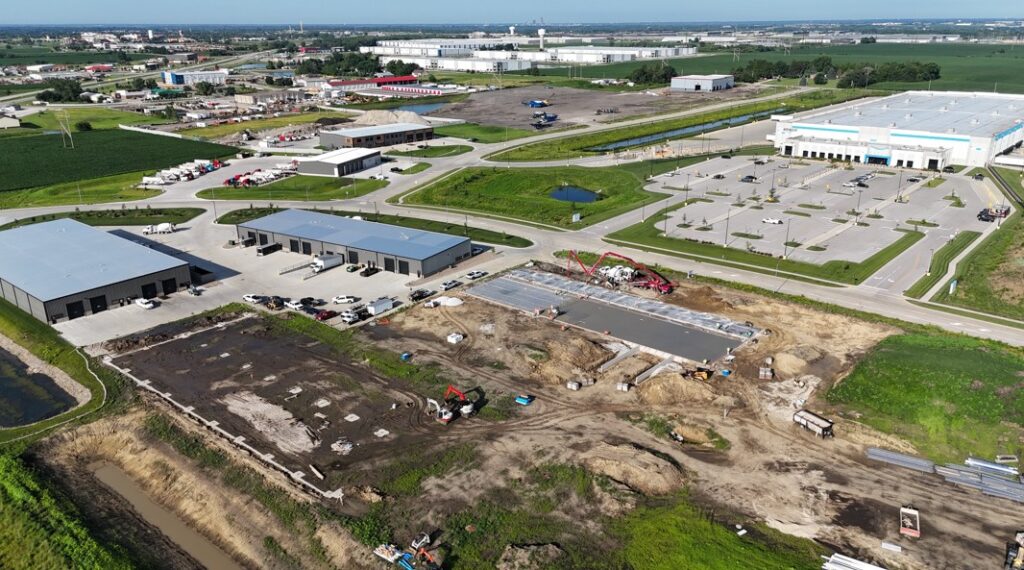Clyde Evans retiring after 32 years with city of West Des Moines
What will he miss most? The chase of landing a project.

Kathy A. Bolten May 19, 2023 | 6:00 am
6 min read time
1,324 wordsBusiness Record Insider, Real Estate and DevelopmentClyde Evans’ first impression about the West Des Moines school district prompted him to apply for a job as the city’s community development director 32 years ago.
Evans was the planning director for Palmdale, California, which in 1991 was the 10th-fastest growing city in the United States. His oldest daughter was about to enter first grade, which was expected to have 45 students and only one teacher. A second daughter was four years younger and was also expected to be in overcrowded classrooms, Evans said.
“It wasn’t going to get better anytime soon,” he said. Evans and his wife, Sharlyn, decided they would either move to northern Oregon or return to the Midwest. When Evans, originally from Illinois, saw a job posting for community development director for the city of West Des Moines, he researched the school district.
“At the time, Valley High School was ranked as one of the top 100 high schools in the country,” Evans said. “My wife and I figured the elementary feeder school system must be pretty good. So truthfully, the reason I applied for the job was because of the school system.”
Evans was hired for the position, joining the city staff in July 1991. At the time, West Des Moines had about 32,000 residents, a 46% increase from its 1980 population of 21,894.
Evans, 70, is retiring in July.
When Evans was hired, the city was in the middle of updating its comprehensive plan. One of his first acts as West Des Moines’ community development director was putting pauses in the process so that members of a citizen steering committee could learn the purpose of comprehensive plans and their relationship to zoning plans.
“I wanted to make sure there were different elements of the comprehensive plan; it’s not just land use,” Evans said. “There are policy statements that dictate what the land use will be, and those policy statements – or goals – set the stage for what the committee wants the city to be when it grows up. … There had not been any discussion about West Des Moines’ future.”
During Evans’ time in West Des Moines, the city’s population has more than doubled to over 71,600 residents. Jordan Creek Town Center, Iowa’s largest shopping complex, opened in the city in 2004. Microsoft Inc. is completing five data center farms in the city. Several large companies, including Wells Fargo, have developed corporate campuses in West Des Moines. Since 1992, the city has issued over 37,000 building permits valued at nearly $11 billion. In three years – 2016, 2021 and 2022 – the value of permits issued totaled over $1 billion.
Has West Des Moines grown up?
“I think we’re still evolving,” Evans said. “You’ve got to set a target out there, and that’s what you need to try to shoot for. … When you look at our community surveys, everyone seems very pleased with the way the city has conducted its business and the amenities we have here. We need to continue to do those type of things, and be innovative.”
We recently caught up with Evans:
What things that have been accomplished in West Des Moines are you most proud of?
A couple of different things. One is the redevelopment that has occurred within the Valley Junction neighborhood, particularly along Fifth Street, where the vibrancy in that area has increased exponentially. And that’s been because of all the programs the city’s created to spur that type of development. A lot of the housing programs that we’re doing, particularly in that neighborhood, are going to pay long-term dividends for the city and stuff. The second is Jordan Creek Town Center and all the development that occurred around there. … I’ve been pretty pleased with the way everything turned out there.
What are you going to miss when you retire?
For the lack of a better term, the chase. I’m very competitive; I don’t like to lose. My adrenaline gets going when we’re working on a project and we’re trying to land it. And then when we do land it, everybody thinks that’s the end of things. It’s only the beginning because then we’re doing development agreements, and maybe infrastructure projects, and all that coordination that goes with it. [Local developer] Bill Knapp has probably retired a half a dozen times. He once told me that it’s the excitement that keeps him going.
What is it that you are leaving on your plate that you would have liked to have seen completed?
I can’t say whom, but I am dealing with another potential data center project. The Grand Experience [a $600 million development proposed along Grand Avenue west of Interstate 35 that is expected to include a large indoor waterpark]. We may be close to having the development agreement done, but I’m not going to be here for when that project starts construction. West Bank won’t be finished by then and neither will the Ruth’s Chris [Steak House] project. There are more things that will happen out in Jordan Creek and we’ve got a big annexation that we’re trying to pull together. We’re looking at 1,300 acres that would take in Fox Creek all the way out to Ute Avenue.
What did you try that you were disappointed that didn’t work?
The business incubator. I think overall, the idea was really good. It was probably a little bit ahead of its time. There were people that didn’t understand that a business might fail. “What do you mean a business might fail?” people asked me. That’s the nature of innovation. Businesses fail, particularly with entrepreneurs, who learn from their failures and get better. Some of our elected people at the time just didn’t understand that.
What is one thing that you’ve been pleased about during your time in West Des Moines?
I’ve been in a lot of communities that have grown really fast. West Des Moines has been growing by an average of about 1,000 to 1,500 people a year, which is a pretty good growth rate. I think we’ve done a really excellent job of managing our growth. … I give the city a lot of kudos for planning, and not just land use planning. They have looked at the kind of roads we are going to need, the infrastructure we will need, where the parks are going to be located. … When somebody says, “I want to develop here,” we’re not going to say, “Well, we don’t know what you’ll need.” We pretty much know. That’s been a hallmark for us that we’ve thought about all of those things ahead of time.
What advice do you have for West Des Moines’ next economic development director?
Don’t worry about trying to fill my shoes. Chart your own path. There are going to be a lot of people saying, “Clyde didn’t do it this way” or “Clyde didn’t do it that way.” [The next director] needs to come with an innovative spirit and not be afraid to try new things. … Don’t be complacent and don’t just do the same old thing.
What are your plans for retirement?
I like history and genealogy. I’m planning some trips to go see the communities my family traveled through as they came through the United States – Virginia, Kentucky, Tennessee, Indiana. … [A distant relative] had a gunpowder mill in Tennessee. At the time, Andrew Jackson was a commander in New Orleans and put out a call for gunpowder. So my seventh great-grandfather loaded up barges that went down the Tennessee River to the Ohio River and then on to the Mississippi River to New Orleans. He got there about three days before the Battle of New Orleans with the gunpowder. [The battle took place in January 1815 between the U.S. and British armies; the Americans won.] If [my relative] hadn’t gotten there, Jackson probably wouldn’t have had any gunpowder. … I want to visit some of those places.

Kathy A. Bolten
Kathy A. Bolten is a senior staff writer at Business Record. She covers real estate and development, workforce development, education, banking and finance, and housing.










